人教版高中英语必修2 Unit 1 Cultural Relics
Unit1 《Cultural relics》文本素材42(新人教版必修2)
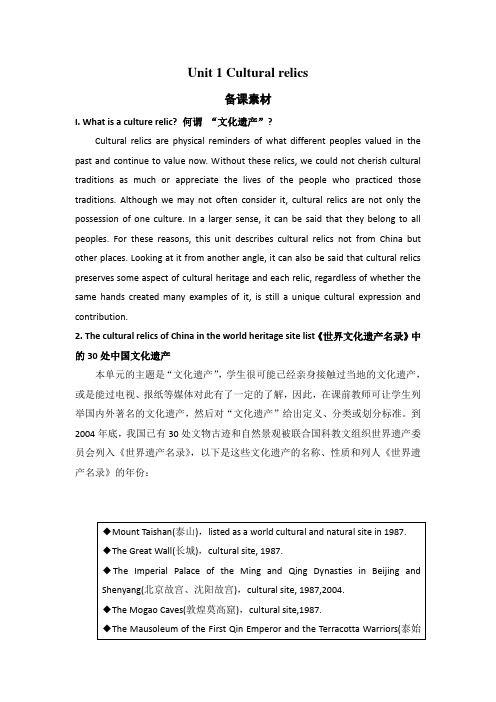
Unit 1 Cultural relics备课素材I. What is a culture relic? 何谓“文化遗产”?Cultural relics are physical reminders of what different peoples valued in the past and continue to value now. Without these relics, we could not cherish cultural traditions as much or appreciate the lives of the people who practiced those traditions. Although we may not often consider it, cultural relics are not only the possession of one culture. In a larger sense, it can be said that they belong to all peoples. For these reasons, this unit describes cultural relics not from China but other places. Looking at it from another angle, it can also be said that cultural relics preserves some aspect of cultural heritage and each relic, regardless of whether the same hands created many examples of it, is still a unique cultural expression and contribution.2. The cultural relics of China in the world heritage site list《世界文化遗产名录》中的30处中国文化遗产本单元的主题是“文化遗产”,学生很可能已经亲身接触过当地的文化遗产,或是能过电视、报纸等媒体对此有了一定的了解,因此,在课前教师可让学生列举国内外著名的文化遗产,然后对“文化遗产”给出定义、分类或划分标准。
Unit1 Cultural-relics知识与要点-新人教版必修2
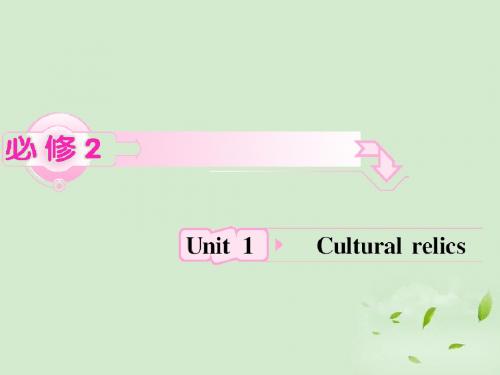
她觉得好像听到身后有脚步声。
Did anything take your fancy? 你看中了什么吗?
温馨提示 fancy用作动词,有时用于祈使句,表示惊奇、不相信、 震惊等,后加名词、代词作宾语,如Fancy meeting you here! 想不到在这儿遇见你!
【链接训练】 He usually appears to be honest.Who can fancy ________ such a thing? A.his do C.his to do B.his doing D.doing
by
5.The broken ship s ank to the bottom of the
6.Rose was doubtful (怀疑) about the whole idea.
7.We have found further scientific evidence (证据) for this theory. 8.You can leave a message with reception (接
有许多古怪的习俗是从早年流传下来的。
归纳拓展 survivor n. 幸存者 survival n.[U] 幸存,存活;[C]过去时代留存下来的人、 物、风俗、信仰等;遗迹;遗风;旧思想 The Poland presidential plane crashed in an area of
dense jungle.There were n林茂密的地区。无人生还。
【链接训练】 ①The firefighter helped the old man ____ the big fire.
A.survive
C.survive in 【解析】 【答案】
Unit 1 Cultural relics(必修二)
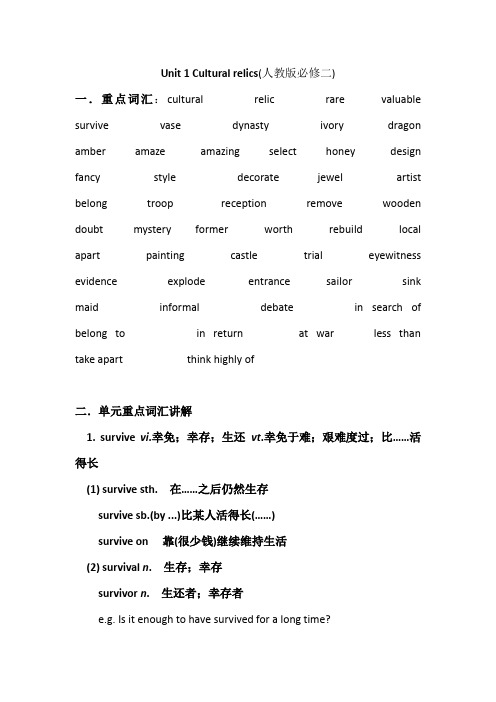
Unit 1 Cultural relics(人教版必修二)一.重点词汇:cultural relic rare valuable survive vase dynasty ivory dragon amber amaze amazing select honey design fancy style decorate jewel artist belong troop reception remove wooden doubt mystery former worth rebuild local apart painting castle trial eyewitness evidence explode entrance sailor sink maid informal debate in search of belong to in return at war less than take apart think highly of二.单元重点词汇讲解1. survive vi.幸免;幸存;生还vt.幸免于难;艰难度过;比……活得长(1) survive sth.在……之后仍然生存survive sb.(by ...)比某人活得长(……)survive on 靠(很少钱)继续维持生活(2) survival n. 生存;幸存survivor n. 生还者;幸存者e.g. Is it enough to have survived for a long time?Some interesting customs have survived from ancient times. 2.amazing adj.令人吃惊的(1) amaze vt.使吃惊;使惊讶(2) amazed adj. 惊奇的;惊讶的be amazed at/by sth. 对……感到惊讶be amazed to do sth. 因做某事而感到惊讶e.g. Frederick William Ⅰ,the King of Prussia, could never have imagined that his greatest gift to the Russian people would have such an amazing history.It was amazing that he knew no-thing about the event. 3.design n.[U,C]设计;图案;构思vt.设计;计划;构思(1) by design =on purpose有意;故意(2) be designed for ... 为……而设计be designed to do sth. 目的是;被设计用于做某事e.g. The design of the room was in the fancy style popular in those days.Can anyone design a better timetable?The programme is designed to help the orphans. 4.decorate v.装饰;装修(1) decorate ... with ... 用……装饰(某物、某处)be decorated with ... 用……来装饰(2) decoration n. 装饰;装饰物e.g. It was also a treasure decorated with gold and jewels, which took the country’s best artists about ten years to make.Decorated with different lights, the living room looks very beautiful.5.remove vt.移动;搬开;脱下;摘掉;开除remove into ...搬入……remove sth. to ... 把某物搬到……remove sb. from ... 从……开除某人e.g. The good news removed all doubts about the company’s future.Please remove your shoes before entering the room when you are in Japan.6.in search of寻找;搜寻in one’s search for寻找……;搜寻……search ... for ... 搜查……;寻找……search for ... 搜寻……;寻找……search sb. 搜身e.g. After graduation, he went to Beijing in search of a job.He turned on his computer in search of the information he wanted.7.belong to属于e.g. However, the next King of Prussia, Frederick William Ⅰ,towhom the amber room belonged, decided not to keep it.As we all know, Taiwan belongs to China.Do you know whom this dictionary belongs to?8.in return作为报答;回报in return for作为对……的报答in turn 依次地;轮流地;反过来;转而e.g. In return, the Czar sent him a troop of his best soldiers.He is always helping people without expecting anything in return.9.at war 在交战;处于交战状态at dawn在黎明;在破晓at work 在上班;在工作at peace 处于和平中;平静at table 在吃饭e.g. This was a time when the two countries were at war.The two countries have been at war for many years. People there are suffering a lot.10.evidence n.[U]根据;证据(1) in evidence可看见的;明显的;显眼的There is some evidence that ... 有证据显示/证明……(2) evident adj. 明显的;明白的It is/was evident that ……很明显e.g. This kind of information is called evidence.We found further scientific evidence for this theory. 11.explode vi.爆炸;(感情)迸发(1)explode with anger勃然大怒explode into laughter突然大笑(2)explosion n.爆裂(声);爆炸(声);迸发e.g. In April 1945 I heard something explode at midnight.At last his anger exploded, but he calmed down after a while. 12.entrance n.入口the entrance to+地点……的入口make an entrance 进入e.g. To my surprise the entrance to the mine was closed.He passed the College Entrance Examination, which made his parents very proud.13.debate n.争论;辩论vi.&vt.争论;辩论(1) have a heated debate进行激烈的辩论under debate在讨论中;在辩论中beyond/without debate无可争议(2) debate sth. with sb.与某人辩论某事e.g. Read the following tips for organizing an informal class debate.After a heated debate, we all agreed on the plan.14.take apart 拆卸;拆开(1) tell ...apart 把……区别开来fall apart 崩溃;土崩瓦解(2) apart from ⎩⎪⎨⎪⎧ 除……以外别无= except 除……之外还有= besidese.g. The old man saw some Germans taking apart the Amber Roomand removing it.How dare you take apart your manager ’s letter?Let ’s take the machine apart and see what ’s wrong with it.15.rather than 与其……倒不如;而不是⎭⎪⎬⎪⎫would do ... rather than do ...would rather do ... than do ...prefer to do ... rather than do ... 宁愿做……也不愿做……e.g. We will have the meeting in the classroom rather than in thegreat hall.In my opinion, he rather than you is to blame.16.think highly of 看重;器重;对……评价高think much/well of ...(= think highly of ...)看重;器重;对……评价高think ill/poorly/badly of 认为……不好think little/nothing of ...轻视;认为……不足为奇e.g. I think highly of those who are searching for the Amber Room.Judging from his expression, he doesn ’t think highly of yourplan.I feel that the boss seems to think highly of you.17. however 与while的区别⑴however意为“然而,可是”,表转折,后又逗号隔开;e.g. I feel a bit tired. However, I can hold on.⑵while意为“然而”,表对比,其后不用逗号隔开。
必修2_Unit_1_Cultural_relics(1)
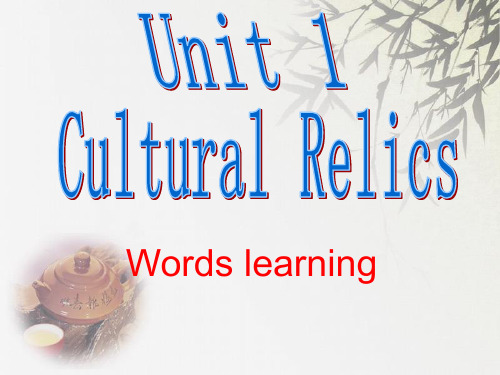
relic n. 遗物;遗风; 遗迹;纪念物。
This ruined bridge is a relic of the civil war.
这座毁坏的桥是南北战争时的遗迹。
This stone axe is a relic of ancient times.
这把石斧是古代的遗物。
take apart拆开
Take the sentence apart and you’ll make its structure clear. 把句子拆开你就会搞清楚它的结构。
Though very young, he was able to take apart the machine skillfully and then put it together without any difficulty. 尽管年轻,但他能娴熟地把机器拆卸开,然后又毫 不费力地组装起来
Your story is several removes from the truth. 你的说法与事实有些距离。
doubt n. 怀疑;疑惑 vt.怀疑;不信 adj. doubtful 可疑的,令人生疑的 adj. Doubtable adj.可疑的, 令人怀疑的
I don’t doubt that he is honest. 我不怀疑他是诚实的。 We doubt if he is honest. 我们怀疑他是否诚实。 There is no doubt that we can finish our task ahead of time 毫无疑问,我们能提前完成任务
She lost all her belongings in the earthquake. 她在地震中失去了所有的财产。
Culturalrelics全单元教案(新人教版高中英语必修2unit1)
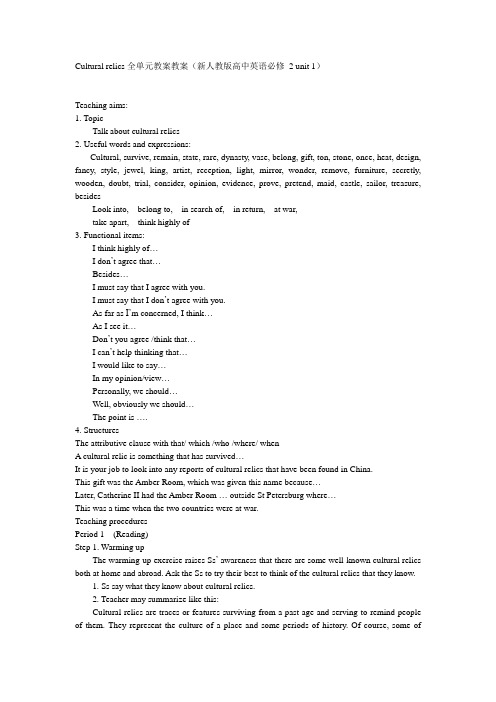
Cultural relics全单元教案教案(新人教版高中英语必修2 unit 1)Teaching aims:1. TopicTalk about cultural relics2. Useful words and expressions:Cultural, survive, remain, state, rare, dynasty, vase, belong, gift, ton, stone, once, heat, design, fancy, style, jewel, king, artist, reception, light, mirror, wonder, remove, furniture, secretly, wooden, doubt, trial, consider, opinion, evidence, prove, pretend, maid, castle, sailor, treasure, besidesLook into, belong to, in search of, in return, at war,take apart, think highly of3. Functional items:I think highly of…I don’t agree that…Besides…I must say that I agree with you.I must say that I don’t agree with you.As far as I’m concerned, I think…As I see it…Don’t you agree /think that…I can’t help thinking that…I would like to say…In my opinion/view…Personally, we should…Well, obviously we should…The point is ….4. StructuresThe attributive clause with that/ which /who /where/ whenA cultural relic is something that has survived…It is your job to look into any reports of cultural relics that have been found in China.This gift was the Amber Room, which was given this name because…Later, Catherine II had the Amber Room … outside St Petersburg where…This was a time when the two countries were at war.Teaching proceduresPeriod 1 (Reading)Step 1. Warming upThe warming-up exercise raises Ss’ awareness that there are some well-known cultural relics both at home and abroad. Ask the Ss to try their best to think of the cultural relics that they know.1. Ss say what they know about cultural relics.2. Teacher may summarize like this:Cultural relics are traces or features surviving from a past age and serving to remind people of them. They represent the culture of a place and some periods of history. Of course, some ofthem are in danger because they are being destroyed.3. Ask the Ss to give some examples of the cultural relics that are in the need of being protected.Step 2. Pre-reading1. Ss discuss and answer:How would you feel if a cultural relic got lost? Why?If you find a cultural relic, what will you do with it?2. Ss look at the two pictures on page 1-2. Ask them if they know what it is called.Step 3. While-reading1. Ss read and find the answers to the following questions:1)Why is it called the Amber Room?2)What happened to the Amber Room?2. Second reading: Ss read again and finish comprehending.3. Listening: Ss listen to the passage and get the main idea of each paragraph.Main idea:Paragraph 1. We can know that the Amber Room has a strange history and know something about its design and building.Paragraph 2. We can know the history of the Amber room and its functions in Russia. Paragraph 3. It tells us that Catherine II had the Amber Room moved to the palace outside St Petersburg.Paragraph 4. It tells us that the Nazi German army stole the Amber Room in September, 1941. After that the Amber Room remains a mystery.Paragraph 5. It tells us that the Russians and Germans have built a new Amber Room at the summer palace, following the old photos.Step 4. After-reading1. Ss discuss and answer: what they can do to protect our cultural relics.2. DebatingSs divided into two parts and debate.Topic: We should rebuild Yuan Mingyuan.We should not rebuild Yuan Mingyuan.Homework1. Recite the key sentences in the text.2. Retell the text.Period 2. (Language learning and grammar)Step 1. RevisionSs try to retell the text, using their own words.Step 2. Language points1. insist that2. 情态动词+ have done3. be made into4. be at war5. remain6. think highly ofStep 3 Discovering useful words and expressions1. Ss read the passage again and try to find word which means each of the meaning on page3, part 1.2. Teach the Ss how to use the dictionary to learn the usage of the phrase: belong to.Step 4. Grammar: The attributive clause1. Ss read the following sentences and try to find the rules.1)It is your job to look into any reports of cultural relics that have been found in China.2) This gift was the Amber Room, which was given this name because…Ask the Ss themselves to find the difference between the two sentences.3. Tell Ss the differences between restrictive attributive clause and non- restrictive attributive clause.Step 5. PracticeSs finish exercises 2 and 3 on page 4.Homework1. Ss finish Wb exercise: using works and expressions.2. Ss finish Wb exercise: using structures.3. Ss collect some information of the cultural relics that are in danger.Period 3. SpeakingStep 1. Revision1. Check Ss’ homework.2. Ask the Ss to say something about what they have collect about the cultural relics that are in danger.Step 2. Lead-in1. Ss watch videos about the world cultural relics.2. Ss find some cultural relics that are in danger and discuss what they will do with them.Step 3. Speaking taskT: China has tens of thousands of cultural relics. Perhaps it is not possible or necessary to save all of them. For example, Bejing is famous for its lanes or traditional houses and yards. Some people say that only the best ones should be saved. Others disagree, and say they make the capital a special place. Now, let’s have a discussion about this in two sides:Do you think China should save all of its cultural relics?Step 4. WritingAsk the Ss to write an article of 100-200 words about the whole discussion and express your opinion at the same time.Homework1. Review the attributive clauses.2. Remember the sentences that express one’s idea.Period 4. ReadingStep 1. Pre-readingT: since cultural relics are important and useful, it’s necessary for everyone to protect them. After all, they belong to the whole world. so today, we’ll read a passage that is about a common person who saves the cultural relics—Big Feng to the rescue. Read the passage for the first time and answer why Big Feng wants to save cultural relics.Step 2. Reading (P44)1. Ss read the passage again and answer the following questions:1). How does he save the cultural relics of his hometown?2). What does “a big heart” mean? In which ways does Feng Jicai show that he has a big heart?3). Why does he think it is more important to do this than to write his novels?4). It is very time-consuming and expensive for Feng Jicai to take care of cultural relics. Can you think of some other ways to help him with his projects?Step 3. Reading, listening and writing1. Ss read the passage on page 5.2. Play the tape. Ss listen to what three people say they know about the missing Amber Room. As they listen, pretend that they are judges.3. Ss listen again and take notes. Then fill in the forms on page 5. decide which of the three people they think gave the best evidence.Step 4. speaking and writing1. Discuss which person gave the vest evidence. Use the following expressions:Are you sure he/ she was telling the truth? How do you know that?How can you be sure he/ she was telling the truth?Why/why not?That can’t be true.I (don’t) believe …, because….I (don’t ) agree that…The truth is (not) easy to know.I can be proved.2. write down a short list of reasons for your choice.Period 5. ListeningStep 1. DictationT: we will have a dictation of the following sentences:1. Frederick William I, the king of Prussia could never nave imagined that his greatest gift to the Russian People would have such a strange history.2. Once it is heated, the amber can be made into any shape.3. It was made for the palace of Frederick.4. In 1716, Frederick William I gave it to Peter the Great, as a gift of friendship from the Prussian to the Russian People.5. In return, the Czar gave the King of Prussia 55 of his best soldiers.6. The Amber Room soon became part of the Czar’s Palace in St. Petersburg.7. Later, Catherine II had the Amber Room moved to the palace outside St Petersburg where she spent her summers.8. This was a time when the two countries were at war.9. There is no doubt that the boxes were then put on a train for Konigsberg, at that time a German city on the Baltic Sea.10. After that, what really happened to the Amber Room remains a mystery.11. I think highly of those who are searching for the Amber Room.Step 2. Listening (P41)1. Listen to the tape for the first time to get the main idea.2. Ss listen again and talks about a temple in Egypt, and then answer the questions on page 41.Step 3. Listening task (P44)Ss listen to the tape three times. At first time, try to get the main idea. At second time, try to spell the missing words as you hear them. At the last time, make some notes about I M Pei’s life. After listening, work in pairs. Each pair writes a short dialogue according to the notes.Period 6. WritingStep 1. Pre-writing1. Ask the Ss to read Johann’s letter first.2. Ss choose their writing models.Step 2. While-writing1. Ss collect their ideas for the letter. Write them down in order.2. Ss begin to write their letters.3. Choose some letters to show in the class.Step 3. Writing task (P46-47)1. Ss choose one cultural relic in their hometown that they think is worth saving. Write a letter to all the students of their school to encourage them to help save the cultural relic. They can use the model on page 46 as a guide.2. Ss check the answers each other.3. T checks the answers in class.Step 4. Project (P47)Ss finish the project as the following steps:1. Get together with three of your classmates and share your letters from the writing task with one another. Read each letter aloud.2. Know take the best ideas from each letter and make an even better plan to protect a cultural relic in your hometown. Explain your reasons.3. Organize your plan step by step to get more and more students to join the project.4. Prepare a short speech and have one member of your group tell you r classmates so that we can protect it well.Period sevenTeachers can use this period freely.Suggestion: Teachers can use this period to let Ss sum up what they have learned and explain what Ss couldn’t understand very well in this unit. Teachers can also add more practice in this period to consolidate what the Ss have learned. Finally, ask the Ss to finish checking yourself. It is very important to improve their learning.。
高考英语一轮复习 Unit 1 Cultural relics单元知识(含解析)新人教版必修2-新人

Unit1Cultural relics1. survive(1) vi.幸免;幸存;生还☞Of the six people injured in the crash,only two survived.因这次撞车事故受伤的六人中,只有两人幸存。
(2)vt.比……活得长;幸免于;从(困境中)挺过来。
其宾语可以是人或事。
sb 比某人活得久survive sth 〔经过某事〕活下来☞(2015·,阅读)Nicholas might not have survived this snowstorm had it not been for TV. 要是没有电视的话,尼古拉斯可能活不过这场雪灾。
☞The company managed to survive the crisis. 公司设法挺过了危机。
【归纳拓展】(1)A survive B by+时间名词A比B活得长……survive on. . . 依靠……生存下来survive from. . . 从……存活下来;流传下来(2)survivor n. 幸存者 survival n. 幸存;残存物【巧学助记】As far as I know, the old man survived the earthquake and he was the only survivor of this village, but nobody knew how he survived. Finally, he survived his wife by 10 years. 据我所知,这位老人在地震中幸免于难,他是这个村子唯一的幸存者,但是没有人知道他是如何幸存的。
最后,他比他的妻子多活了10年。
【跟踪典例】完成句子。
①After the big fire, _________________ .大火之后,仍有一些树木残存。
②My grandma _____________________ ten years.我祖父去世以后,我祖母又活了10年。
人教版英语必修2-Unit1-cultural-relics-知识点详解
高一必修2 Unit1:Cultural relics知识点及12.belong to sb 属于某人( owned by sb)Tom did well at the party, but the evening belonged to Lucy.注意:belong to既无被动形式,也不能用于进行时。
to为介词,可跟名词或代词作宾语。
可用于V-ing形式作后置定语13.in return作为对…的报答,以答谢You gave me your watch and in return I gave you my book.14.serve as 当,担任,充当He served as a waiter there.15.reception n.c. 接待处,招待会,接待仪式,欢迎会a wedding reception 结婚喜宴u. 接纳,迎接(the act of receiving or welcoming sb.)a reception centre 接待站16.consider1)(尤指为做出决定)仔细考虑,细想.)consider + n./doing/wh- + to do/that-clauseShe considered her options.她考虑了自己的各种选择We’re considering buying a car.2)认为;以为;觉得( to think of sth. in a particular.)consider + n/that-clause/+(to be/as) + n./adj./to do consider+宾语+宾补He considers it a great honor to give a speech during the meeting.17.was/ were able to 表示过去经过努力,成功地做了某事,表达一种结果。
类似于succeeded in doing 或managed to do的含义。
(完整版)高中英语必修2课文及原文.doc
高中英语必修2(人教版)Unit1 Cultural relicsIN SEARCH OF THE AMBER ROOMFrederick William I, the King of Prussia, could never have imagined thathis greatest gift to the Russian people would have such an amazing history.This gift was the Amber Room, which was given this name because severaltons of amber were used to make it. The amber which was selected had abeautiful yellow-brown colour like honey. The design of the room was in thefancy style popular in those days. It was also a treasure decorated with goldand jewels, which took the country's best artists about ten years to make.In fact, the room was not made to be a gift. It was designed for the palace of Frederick I. However, the next King of Prussia, Frederick William I, to whom the amber room belonged, decided not to keep it. In 1716 he gave it to Peterthe Great. In return, the Czar sent him a troop of his best soldiers. So the Amber Room became part of the Czar's winter palace in St Petersburg. Aboutfour metres long, the room served as a small reception hall for important visitors.Later, Catherine II had the Amber Room moved to a palace outside St Petersburg where she spent her summers. She told her artists to add more details to it. In 1770 the room was completed the way she wanted. Almost six hundred candles lit the room, and its mirrors and pictures shone like gold. Sadly, although the Amber Room was considered one of the wonders of the world, it is now missing.In September 1941, the Nazi army was near St Petersburg. This was a time when the two countries were at war. Before the Nazis could get to the summer palace, the Russians were able to remove some furniture and smallart objects from the Amber Room. However, some of the Nazis secretly stolethe room itself. In less than two days 100,000 pieces were put inside twenty-seven wooden boxes. There is no doubt that the boxes were then put1on a train for Konigsberg, which was at that time a German city on the BalticSea. After that, what happened to the Amber Room remains a mystery.Recently, the Russians and Germans have built a new Amber Room atthe summer palace. By studying old photos of the former Amber Room, theyhave made the new one look like the old one. In 2003 it was ready for thepeople of St Petersburg when they celebrated the 300th birthday of their city.A FACT OR AN OPINION?What is a fact? Is it something that people believe? No. A fact is anythingthat can be proved. For example, it can be proved that China has more peoplethan any other country in the world. This is a fact.Then what is an opinion? An opinion is what someone believes is true buthas not been proved. So an opinion is not good evidence in a trial. Forexample, it is an opinion if you say“ Cats are better pets than dogs” . It may be true, but it is difficult to prove. Some people may not agree with this opinion butthey also cannot prove that they are right.In a trial, a judge must decide which eyewitnesses to believe and which notto believe. The judge does not consider what each eyewitness looks like orwhere that person lives or works. He/she only cares about whether theeyewitness has given true information, which must be facts rather thanopinions. This kind of information is called evidence.第一单元文化遗产阅读一寻找琥珀普鲁士国王腓特烈·威廉一世从未想过他送个普鲁士人民伟大的礼物会有一点如此惊奇的历史。
高中英语 Unit1 Cultural relics教案 新人教版必修2-新人教版高一必修2英语教案
Unit 1 Cultural relics随堂练习1、Fill in the blanks with proper words〔the first letter is given〕The topic of this unit is cultural relics. A cultural relic is something that has survived for a long time, often a part of something that has remained when the rest of it has been destroyed; it tells people about the past.2、Read the passage again and choose the best answer for each blank.①The king of Prussia who gave the Amber Roomas a gift to Russia was B.A Frederick ⅠB Frederick William ⅠC Peter the GreatD Catherine Ⅱ文某某息:Frederick William Ⅰ, the king of Prussia, could never have imagined that his greatest gift to the Russian people would have such a strange history.〔Parag1〕②The king of Prussia gave the Amber Room to Russia because D.A he wanted to marry Catherine ⅡB he was kindC he needed better soldiersD he wanted to make friends文某某息:In 1716, Frederick William Ⅰ, gave it to Peter the Great, as a gift of friendship from the Prussian to the Russian people.〔Parag2〕③The Amber Room was stolen by B.A Russian soldiersB German soldiersC people in KonigsbergD people in St Petersburg文某某息:But some of the Nazis secretly stole the AmberRoom itself.④In 1941, the city of Konigsberg was in A.A GermanyB RussiaC SwedenD France文某某息:But some of the Nazis secretly stole the AmberRoom itself.⑤The Russians didn’t hide the Amber Room because C.A they were at warB they couldn’t find a placeC the German soldiers arrived too soonD no train could take it away文某某息:This was a time when the two countries were at war.3、Look at every statement. If you are “sure〞 it is true, mark “S〞 to the leftof it. If you are “not sure〞, mark “NS〞.〔NS〕1 The Amber Room was not easy to make.〔S〕 2 Catherine Ⅱdidn’t like everything about the Amber Room when she first saw it.〔S〕 3 The Amber Room was taken to Konigsberg and hidden there in 1941.〔NS〕4 The Russians didn’t care about the Amber Room.〔NS〕5 The Russians don’t think the Amber Room will ever be found.课堂笔记1、He insists it belongs to his family.他坚持说这是他家的。
人教版高中英语必修二《Unit 1 Cultural relics 》Section A Warming Up and Reading2 课件
hall for the guests of Frederick I.
• 3. The Amber Room was taken apart, put inside some wooden boxes and taken away
Amber Room
Fill in the form:
Year What happened to the Amber Room
In 1716 , Frederick William I gave
1716
the Amber Room to Peter the Great , as a gift of friendship from Prussian to the Russian people.
In the spring of 2003, a new Amber 2003 Room was built at the Summer
Palace, and it was used to celebrated the 300th birthday of St Petersburg.
Description of the Amber Room
St.Petersburg and served as a smallr_e_c_e_p_ti_o_n hall for important visitors. Later,Catherine II told her artists to _a_d_d__ more details __t_o__ its design. Unfortunately, in September,1941,When Russia and Nazi Germany were _a_t _ war, the Amber Room was secretly
- 1、下载文档前请自行甄别文档内容的完整性,平台不提供额外的编辑、内容补充、找答案等附加服务。
- 2、"仅部分预览"的文档,不可在线预览部分如存在完整性等问题,可反馈申请退款(可完整预览的文档不适用该条件!)。
- 3、如文档侵犯您的权益,请联系客服反馈,我们会尽快为您处理(人工客服工作时间:9:00-18:30)。
人教版高中英语必修2 Unit 1 Cultural Relics
Step 1 Pre—reading
我用powerpoint分别展示三幅图片以及播放有关的三段介绍录音,并不需要学生详细记录细节,因为不是听力课,只是了解图片是什么地方,位于哪个国家等。
(look at three pictures and listen to three tourist guide describe each of them. )
1、3 为学生所熟悉的
1.The Pyramids in Egypt
2.Machu Picchu in Peru
3.The Great Wall of China
然后问问题:
what do you think of them?
(They represent the culture of their countries ,so they are called______)引导学生讲出cultural relics这个词组
接着分别说出cultural relics的定义(学生个人观点)
(引入部分使学生对本节课的话题有所了解,而且很有兴趣了解其它文物)
Step 2 While-reading
使学生了解Amber Room形成、发展, 经历了几个阶段
1、让学生解释文章的title--In Search of the Amber Room (Maybe it’s lost)
2、为了让学生知道琥珀屋是什么样子,帮助理解文章,教师展示多张图片,新旧琥珀屋对照、外观、以及里面摆设的琥珀,金碧辉煌的琥珀屋使学生大开眼界,叹为观止,并学会分辨新旧。
3、先给出一系列问题,让学生带着问题阅读课文(scanning)。
有目的性阅读是阅读训练一种技巧,并且提醒学生不用太多花大多注意力在人名、地名上面,而假设自己正在读一本侦探小说,集中精力探究事情的发生经过。
4、要求学生回答问题(大部分学生能找到答案)
5、在了解细节的基础上,再次阅读(skimming)。
全班分5个小组,分配任务给每一个组,文章共有5段,每组概括一个段落的大意,而且要求使用不超过3个单词来概括,既降低了难度又提高了学生归纳能力。
Step 3 Post-reading
学生掌握每段大意后,从总体上已经把握了文章结构和特点
1、找出与Amber Room有关的重要线索(3个人物、2个国家、1个组织)
2、分析写作手法(时间顺序及都用了一般过去时描述已发生的事情):让学生将来进行写作训练描述某事经过时,可以模仿这篇文章.
3、复述课文,教师给出一段文字,中间有不少空格,学生根据课文内容填写空格(learn how to talk about cultural relics)
Fill in the blanks:
The Amber Room was made ________. Frederick WilliamⅠ________. It soon became part of the Czar’s winter palace in St. Petersburg. Later, Catherine Ⅱ________ and she told her artists to ________. In September, 1941the Nazi Germany army secretly ________. After that, what happened to the Amber Room ________. Now Russians and Germans have ________ much like the old one.
4、谈谈自己从中的收获(What can you learn from the text?)
学生都能说出要保护文物(完成本课教学目标)
5.布置作业:复习课文及写一篇如何保护家乡某一文物的文章。
